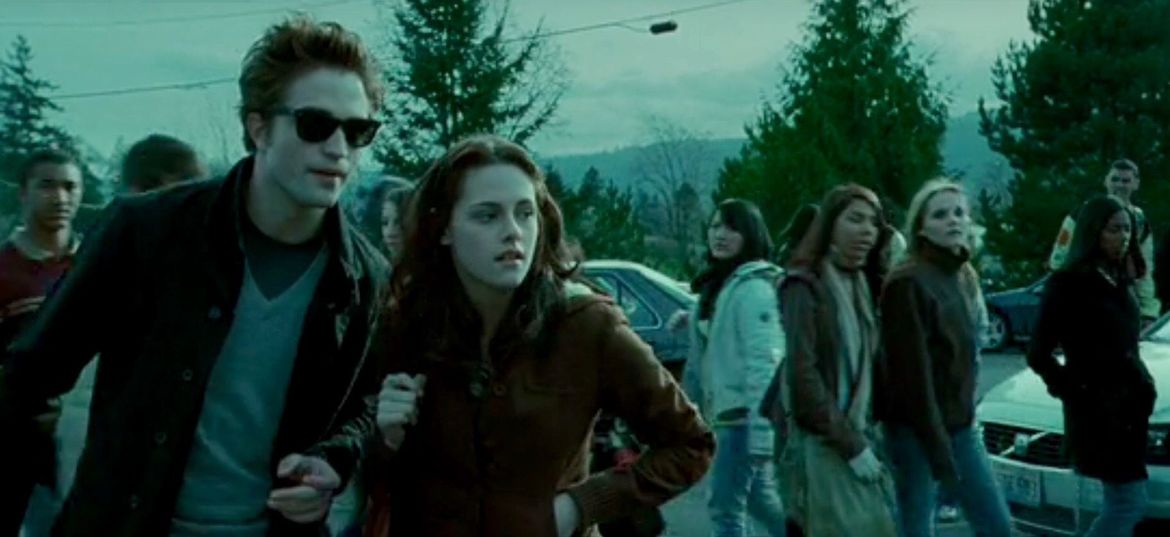The first question I asked myself was: what role, if any, does Twilight play in the genre of horror? And while Twilight itself is not strictly speaking a horror film, what horror elements does it include, and what impact has it had (for better or worse) on the horror/vampire genre as it exists today? Well, the vampire itself is inherently an element of horror. As a monster that arose in its present form from Gothic Horror literature titles such as The Vampyre, Carmilla, and Dracula, the vampire has been a staple antagonist in horror film for decades. Classically, the character of the vampire has been used to explore the thematic relationships between sex, death, and violence. The vampire as a monster is an essentially sexual one. Vampires are often used as a catalyst for authors and filmmakers to explore ‘sexual taboos’, such as homosexuality/homo-eroticism in a text like Anne Rice’s Interview with the Vampire, or female sexuality in a character like Lucy in Bram Stoker’s Dracula. To return to Twilight, I find it interesting to think about what similar themes the archetype of the vampire could be being used to explore, especially when keeping in mind the variety of sexually conservative themes brought in by Stephanie Meyer’s background. For the most part, I see these themes represented best in the character of Bella.
I’ll probably lose film critic cred for this but I must say...I mostly like Bella Swan as a character. No doubt that she has a lot of faults, but in many ways she is an extremely relatable depiction of a teenage girl with a crush. Her life-or-death relationship with Edward may seem dramatic, but honestly, most of the books’ readership was young girls whose feelings at that time probably felt very similar. However, my favorite thing about Bella in the context of sexuality, is that she is the main initiator of her physical relationship with Edward. Twilight flips the script on the classic pure heroine being seduced by the vampire. Instead, it is Bella who is trying to seduce Edward. She spends most of the books more or less sexually frustrated because her century-year-old vampire boyfriend wants to wait until marriage. I find this not only extremely entertaining, but also a pretty interesting inversion of such a standard vampire film troupe.
To return to what horror elements can be seen in the film, I see a number of common horror themes and tropes reflected in the series. And to be perfectly honest, several of the early Twilight films have actually scary moments. In the first film, the scene were the vampire James attacks Bella in her childhood dance studio is genuinely frightening. James is brutal, sadistic, and ruthless in a way very few other vampires in the Twilight universe are. The violence of the vampires is exemplified again in the new-born vampire army’s feeding frenzy in Eclipse. Additionally, the sequence where Bella is cornered by a group of men seemingly intending to sexually assault her as she walks alone at night is more than a little sickening. I chalk most of the fear factor in such seems up to Catherine Hardwicke’s stylized direction (I honestly would love to see her make a horror movie), but there is no denying that there are many elements of Twilight that carry on the legacy of vampire horror flicks past. Not to mention that the film’s set up is straight up horror. ‘Lonely girl moves to a small town with a secret family of immortal monsters’ seems like a movie that could have gone in a very different direction.
To wrap up, I’ll just say it. I love Twilight. What started out as a guilty pleasure watch has transformed into one of my favorite movies of all time. And of course, there are things to critique about these films. The unhealthy co-dependency of Edward and Bella or the anti-abortion undertones of the fourth film are perfectly valid aspects of this series to critique, and I could write another whole essay about them. However, today I wanted to write in defense of Twilight, because I see more than a couple good reasons that this series became the phenomenon that it did. It remains to this day, the highest grossing movie ever directed by a woman, and an integral part of the history of vampire cinema. So the next time you hear someone bashing Twilight, send them my way.


No comments:
Post a Comment